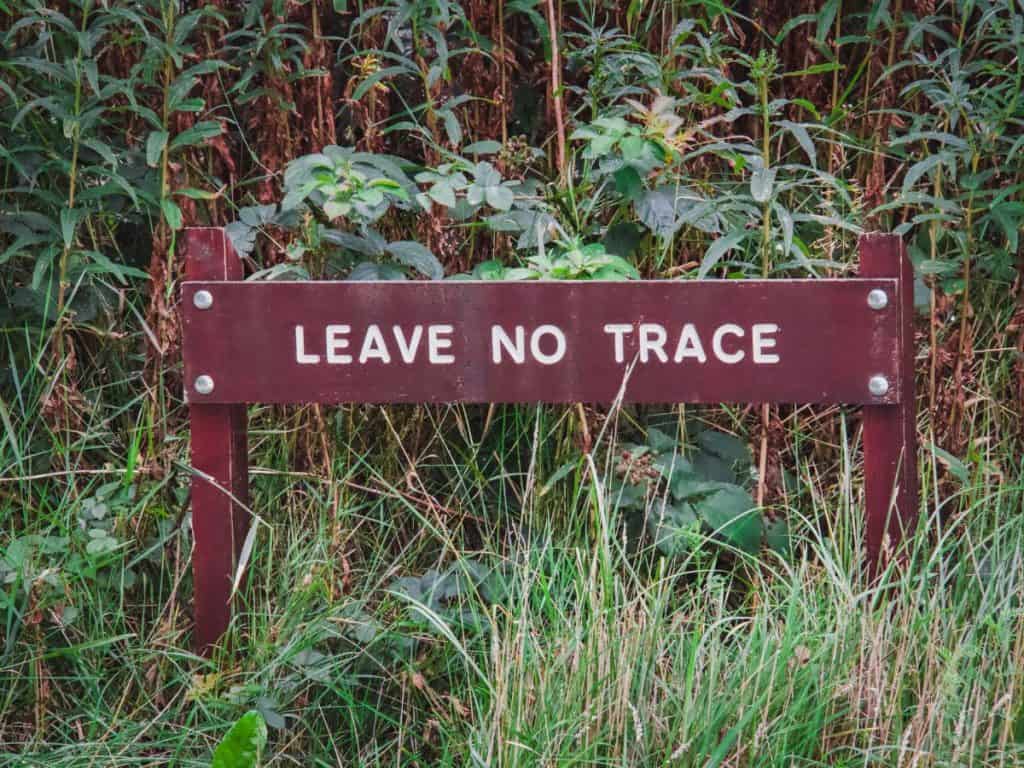Ask anyone who’s spent a night under canvas in the middle of nowhere – wild camping in England & Wales has a strange kind of magic. The silence, the stars, the feeling that you’ve briefly slipped off the map. The problem, specifically in England and Wales, is that the map still belongs to someone else.
Rules around wild camping in England & Wales are messy. One hill might be owned by a national trust, the next by a private estate, the next by a farmer who’s never seen a tent in his field and won’t be thrilled if he does. It’s confusing, full of grey areas, and changes depending on who you talk to.
So, can you legally wild camp in England and Wales?
Wild camping is not legally permitted in England or Wales without the landowner’s consent, except for limited areas of Dartmoor National Park, where recent agreements now allow backpack camping within designated zones. Elsewhere, you’ll need to ask permission or choose an organised “wild-style” campsite such as Nearly Wild Camping or small farm-based sites that welcome low-impact campers.
If that already sounds like a headache, don’t worry – once you understand how the system works, it’s surprisingly easy to find legal, peaceful places to pitch. Let’s start with why things ended up this way in the first place.
Contents
- Why Wild Camping Feels Complicated in England & Wales
- What the Law Actually Says
- Dartmoor: The Only Legal Exception (Kind Of)
- Getting Permission: Landowners, Farmers & the Real-World Approach
- Clever Alternatives to True Wild Camping
- Low-Impact Camping Tips
- Final Thoughts
Why Wild Camping Feels Complicated in England & Wales
If you’ve ever looked at photos of people wild-camping up in the Highlands, you’d be forgiven for thinking the same rules apply everywhere in the UK. Big empty spaces, a small tent by a loch, nobody around for miles – it looks like total freedom. Then you cross the border into England or Wales, pull into a quiet lay-by with that same adventurous sparkle in your eye, and suddenly everything feels… murkier.
That’s because, unlike Scotland, England and Wales don’t recognise a general right to roam or camp on open land. The land might look wild, but in legal terms almost every square metre belongs to someone, whether that’s a farmer, an estate, the National Trust, or a water company. You can walk many of these areas under the Countryside and Rights of Way Act (2000), but the right to walk doesn’t include the right to sleep. Once you pitch a tent, you’ve technically crossed from “access” into civil trespass territory.
That word trespass sounds dramatic, but in practice it usually means the landowner can ask you to move on – not fine you or call the police (unless you ignore them or cause damage). Still, it’s enough of a grey area to make most people uneasy. Nobody wants to be woken at 2 a.m by headlights and a grumpy chap with a shotgun telling you, “You can’t stay here, mate”.
This patchwork of private ownership explains why wild camping feels so complicated south of the Scottish border. The land is stunning, the urge to explore is strong, but the law was written long before lightweight tents and Instagram sunsets made “wild camping” a lifestyle.
To get your head around what’s actually allowed, we need to separate myth from fact. So, let’s look at what the law really says, and what counts as “illegal” when it comes to pitching up for the night.
What the Law Actually Says
When it comes to wild camping in England & Wales, the law isn’t vague; it’s just not in your favour.
Under current rules, you can’t legally pitch a tent on any land without the owner’s permission. That includes moorland, woodland, beaches, and those remote hills that look like nobody’s stepped foot on them for years. Unless you’ve got the landowner’s blessing or you’re inside a specific area that allows it (more on Dartmoor in a moment), camping there is classed as civil trespass.
Civil trespass isn’t a criminal offence (you won’t end up in court just for rolling out your sleeping bag) but the landowner (or their representative) does have the right to ask you to leave. If you refuse, or if they claim you’ve caused damage, lit fires, or left rubbish behind, things can escalate quickly. The police can get involved under anti-social behaviour or criminal damage laws, and in the worst cases, campers have been fined or had gear confiscated.
But let’s be real: most wild campers aren’t the problem. It’s not the quiet hiker who slips in late, leaves no trace, and is gone by sunrise. It’s the noisy few (the ones who leave cans in the grass or light fires on peat) that give everyone else a bad name and keep the laws tight and restrictive.

That’s why responsible wild camping in England & Wales tends to sit in a legal grey zone. It’s technically not allowed, but quietly tolerated in some areas if you’re respectful, discreet, and move on quickly.
If you’re the type to play it safe (and avoid awkward chats at dawn), there is one corner of the country where you can still camp without a written note from a landowner, although even that has become a bit of a saga. So let’s talk about Dartmoor – the only place in England where wild camping is officially recognised (sort of!) and the heart of one of the strangest outdoor legal battles in recent years.
Dartmoor: The Only Legal Exception (Kind Of)
For years, Dartmoor was the one place in England where you could properly wild camp without needing to hunt down the landowner first. The Dartmoor Commons Act 1985 was widely interpreted to allow backpack camping across much of the national park – a sort of quiet handshake agreement between walkers and the land itself.
Then, in January 2023, unfortunately that all changed. The wealthy owners of the Blachford Estate took the park authority to court, arguing that the act didn’t actually include the right to camp overnight. And to almost everyone’s surprise, the High Court agreed. Overnight, what had been an accepted tradition for decades became technically off-limits.
The backlash was immediate, and arguably justified. Thousands of hikers, locals, and outdoor groups rallied in protest, seeing it as an attack on access to nature. Within weeks, the Dartmoor National Park Authority reached a deal with landowners to restore limited wild camping rights, but with new conditions.
Now, the rule is this: you can wild camp only within specific mapped areas of Dartmoor, on foot, with a lightweight setup, and only for short stays. Campers are asked to pitch late, leave early, avoid fires, and keep groups small. There’s even a Dartmoor camping map on the park’s official site showing exactly where you can and can’t camp legally.
It’s not perfect unfortunately – the areas are smaller than before, and technically the right exists only because of an agreement, not a legal guarantee – but it’s still something. In a country where “wild camping” often means being told to move on, Dartmoor remains a tiny patch of genuine freedom.
If you’ve never been, picture vast, rolling moorland dotted with hills and beautiful little streams. The nights are windy, the stars are wild, and the sense of space is unmatched. Just make sure to check the Dartmoor camping map before you go, and remember that the situation could change again depending on future landowner agreements or challenges.
So if Dartmoor’s your only guaranteed option, what about the rest of England and Wales? The short answer is: you’ll need permission, but getting it might be easier (and less fraught with tension!) than you think.
Getting Permission: Landowners, Farmers & the Real-World Approach
Outside of Dartmoor, the only fully legal way to wild camp in England or Wales is by getting permission from whoever owns the land. That could mean a local farmer, a private estate, or even the National Trust.
Now, “asking permission” sounds like a hassle, but in reality it’s usually just a polite conversation. If you’re respectful, explain that you’re using a small tent, leaving no trace, and you’ll be gone by morning, you’d be surprised how often people say yes. Farmers are outdoors people too, and they just want to know you’re not about to start a fire, leave rubbish, or spook their livestock.
The trick is to keep it simple. If you’re walking through farmland or crossing public rights of way, keep an eye out for someone working – a tractor, a barn, a farmhouse etc. Approach with a smile, explain what you’re doing, and ask if there’s a quiet spot you can pitch for the night. Some will say no, and that’s their right. But you’ll also meet those who shrug and say something like, “Aye, as long as you’re gone before the cows are“.

If knocking on doors isn’t your thing, you can try contacting local landowners ahead of time, especially if you’re planning a multi-day hike. The National Trust, Woodland Trust, and smaller estates sometimes grant permission if you email the local warden or ranger.
It’s also worth checking for farm-based sites that bridge the gap between wild and official camping. Many farms now run small-scale “wild-style” pitches – no toilets, no hookups, just a patch of grass and a sunset view. Technically it’s not wild camping, but it scratches the same itch without breaking the law.
Think of permission as the social version of Leave No Trace. You’re not just leaving the land how you found it; you’re leaving the people happy to see wild campers again next time.
Of course, not everyone wants to spend their trip negotiating over hedge gates. If you’d rather just pitch up somewhere that feels wild but keeps you on the right side of the rules, there are plenty of clever alternatives popping up across the country.
Clever Alternatives to True Wild Camping in England & Wales
If the whole permission thing sounds like too much admin for one night under the stars, you’re not alone. That’s why a growing number of campers are turning to “wild-style” campsites – places that feel off-grid but come with the quiet comfort of legality (and sometimes even a compost loo!).
The idea is simple: you get that back-to-nature feeling without worrying about a midnight knock on your tent.
Here are a few of the best options:
1. Nearly Wild Camping
This one’s a bit of a hidden gem. Nearly Wild Camping is a UK-wide network that links campers directly with landowners who are happy to host low-impact visitors. Think small fields, forests, riverbanks, and tucked-away corners of farmland – all legal, all booked online. Some sites are basic to the point of primitive; others have a tap and a composting toilet. Prices are modest, and you get the thrill of proper wild camping without the legal grey area.
2. Farm Stays and Eco-Sites
Lots of farmers have embraced “wild camping” as a side hustle, and they’re doing it well. These spots tend to have minimal facilities (sometimes just a field and a fire pit) but give you freedom and privacy you won’t find on a holiday park. Look for listings on Pitchup, Hipcamp, or Greener Camping Club for sites that prioritise peace, sustainability, and space over plug sockets.
3. Woodland and Private Estate Pitches
Some woodlands now offer micro-camping experiences where you can book an exclusive patch of forest. You bring your own gear, follow leave-no-trace principles, and often have the place to yourself. Wild With Consent is another platform connecting campers directly with landowners for this kind of setup – ideal if you crave solitude but don’t fancy legal guesswork.
4. Bothies and Backpacker Huts
Not quite camping, but they scratch the same itch. Scattered across upland areas and national parks, bothies and simple huts offer a roof, a hearth, and a bit of wild charm. They’re basic (no electricity, no booking fees) but for hikers and long-distance walkers, they’re the ultimate middle ground between tent life and a proper bed.
These “clever alternatives” are changing the face of wild camping in England and Wales. They let people enjoy the wilder side of the outdoors without clashing with landowners or local authorities, and they’re growing fast.
But no matter where you camp (wild, nearly wild, or somewhere in between) the same golden rule applies: leave it better than you found it. So let’s talk about that briefly next.
Low-Impact Camping Tips
The golden rule of wild camping in England & Wales (whether you’re tucked into a Dartmoor valley or snoozing behind a dry-stone wall in the Lakes – with permission, of course!) is simple: make it look like you were never there.

That’s not just good manners; it’s the only way wild camping stays quietly tolerated. A single bad camper can ruin access for everyone else. Here’s how to stay invisible in all the right ways:
1. Arrive Late, Leave Early
Pitch your tent around dusk, and be gone soon after sunrise. You’ll stay off most people’s radar, and you’ll catch the best light of the day.
2. Keep It Small
One or two people, one small tent. No big group setups, no gazebos, and no fairy lights. The smaller your footprint, the more welcome you’ll be.
3. Don’t Light Fires
Tempting as it is, open fires are a quick way to destroy trust (and in dry conditions, entire ecosystems). Use a small camping stove instead – they’re safer, cleaner, and won’t scar the ground.
4. Pack Out Everything
That includes food scraps, tissues, and even those sneaky bits of foil or string that always seem to appear when you’re packing up. A quick sweep of your pitch before you leave is all it takes.
5. Stay Quiet and Respectful
You’re a guest. The sheep, birds, and locals were there first. Keep noise down, especially at night, and avoid pitching too close to footpaths, houses, or livestock.
6. Don’t Overstay
One night, maybe two. If you find a magical spot, brilliant – enjoy it, then move on. The more transient you are, the more likely it’ll still be there for others.
Following these basics doesn’t just keep you out of trouble; it helps shift how landowners and communities see wild campers. The more of us who camp responsibly, the harder it becomes to argue against the right to do it. So, where does that leave us? Let’s pull it all together – the laws, the loopholes, and the honest ways to get your wild fix without winding anyone up.
Final Thoughts
So, can you wild camp legally in England and Wales? The short answer is: not really, but also, kind of…
Outside Dartmoor, it all comes down to permission and common sense. The rules might be strict, but they’re not impossible. Ask politely, keep your impact low, and most landowners won’t see you as a problem. And if that sounds like too much faff, the growing network of wild-style sites means you can still wake up to birdsong and misty hills without breaking the law.
In a way, that mix of caution and curiosity is part of what makes wild camping here special. You’ve got to earn it, by planning, respecting the land, and treading lightly. When you finally unzip your tent at sunrise, hearing nothing but the wind through the grass, you’ll know exactly why people go to all this effort just to sleep outside.
Related Posts
If you’re planning a trip or want to understand the rules in more depth, these guides might help:
- Can You Camp Anywhere in the UK? – The Ultimate Wild Camping Law Guide for 2025
- Wild Camping in Scotland: Rules, Best Spots & Essential Tips
- What Is the Punishment for Wild Camping in the UK?
